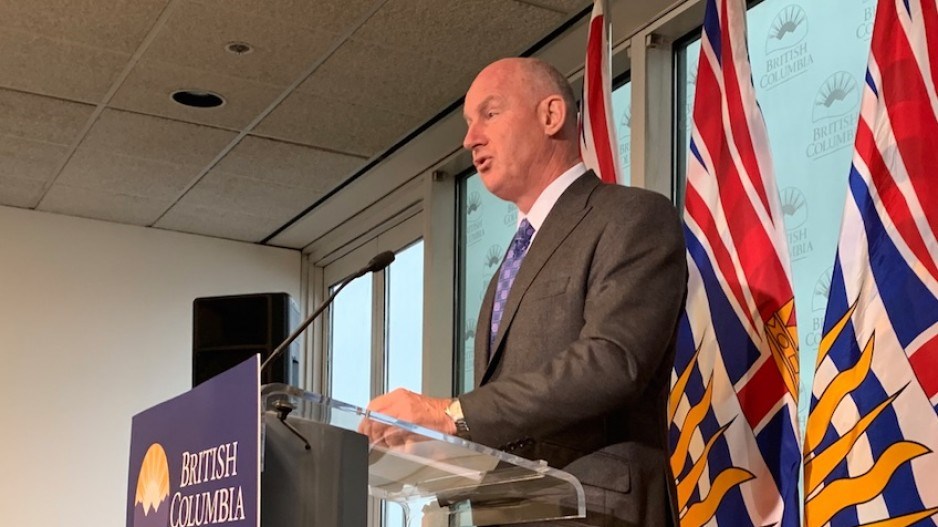People caught at road checks and ferry terminals travelling for non-essential reasons outside their health regions could be fined $575, B.C. Solicitor General Mike Farnworth said as he announced new travel restrictions that came into effect Friday.
“The time has come to formally restrict non-essential travel,” Farnworth said.
The new health order establishes three regions — Vancouver Coastal Health and Fraser Health, Northern and Interior Health, and Island Health. It prohibits non-essential travel between them. The order also includes non-essential travellers from outside the province.
The order, under the Emergency Program Act, will remain in place until after the Victoria Day long weekend, ending May 25, said Farnworth.
“While this new legal order targets those who are travelling across regional zones for recreational purposes, the advice from [provincial health officer Dr. Bonnie Henry] to stay local remains in place everywhere in B.C.,” Farnworth said. “Do not go to Whistler or Tofino – even on a day trip. Everyone should stay close to home.”
B.C. Ferries said the travel restrictions affect the Tsawwassen-Swartz Bay, Tsawwassen-Duke Point, Tsawwassen-Southern Gulf Islands, Horseshoe Bay-Departure Bay, Comox-Powell River and Port Hardy-Prince Rupert routes.
Customers will be asked if their travel is essential, and denied passage if it is not. Recreational travellers on routes that operate within the same region will be reminded that non-essential travel is restricted.
The list of categories for essential travel includes commercial transportation of goods, returning to a principal residence, attending work or school, accessing child or health care, assisting someone needing physical or psychological health care, attending court, search and rescue operations, and attending a funeral.
On Friday, the province reported 1,001 new COVID-19 cases in B.C., including 26 in Island Health; 486 people were in hospital for COVID, including 160 in critical or intensive care.
Details of enforcement measures for travel restrictioms won’t be revealed until next week. “I want to make sure this is done right,” Farnworth said of the delay.
The province said it will work with police to establish periodic road checks at key travel corridors during times associated with leisure travel to remind travellers of the order.
The National Police Federation, which represents 7,000 RCMP members in the province, is concerned officers could be at risk of public backlash, “legal ambiguity” and possible infection, union president Brian Sauve said in a statement.
The B.C. Civil Liberties Association said while it agrees with the need to restrict travel, it’s “alarming” there is still no detail on the scope of police powers to enforce travel restrictions. Executive director Harsha Walia said the group is concerned about constitutional and privacy issues, as well as potential harm to people because of their race.
Meghan McDermott, interim policy director, said the province needs to tell people what their rights are if stopped by an officer seeking to enforce the travel-restrictions order.
Farnworth said he has met with groups to limit potential impact on people based on their race.
Tourism-oriented businesses, including hotels and campgrounds, are being asked not to accept bookings from outside their health regions.
Bill Lewis of the Magnolia Hotel in downtown Victoria said he has cancelled about 120 room nights in the last week, representing about $30,000 in bookings over the next five weeks. Some people called to cancel, while he contacted others who were from outside the Island region. Some customers pushed their reservations into the summer.
Many more people haven’t been booking at all, given the added risks of the third wave of COVID-19. The hotel is promoting itself with specials to local residents for now.
Lewis said he’s happy to do his part for the next five weeks to bring down transmissions as vaccinations increase.
“There is pain involved, but let’s push hard now and see if we can save the summer,” Lewis said.
International travel won’t be back by then. “But if we can at least welcome British Columbians and potentially domestic travellers from all across Canada, that will allow us to have something of a tourist season as opposed to what we have right now.”
Anthony Everett, president and CEO of Tourism Vancouver Island, said he’s calling on members to discourage bookings from outside the region and cancel the ones in place. He said he’s trying to help members market themselves to local residents.
“This is a very different time than last year,” said Everett. “This year, I’m really worried about this going into summer because that would really damage the industry.”
— With a file from The Canadian Press



